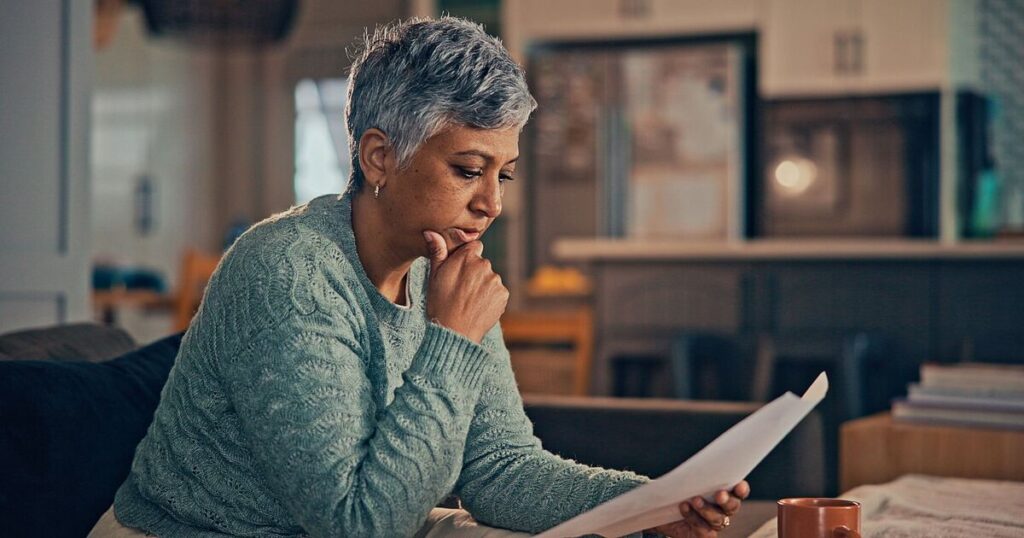
The Department for Work and Pensions (DWP) has announced that the awaited reforms to Universal Credit will roll out in April 2026, and the anticipated modifications to Personal Independence Payment (PIP) are set to begin from November next year.
In a bid to ease concerns, Minister for Social Security and Disability Sir Stephen Timms declared: “We (DWP) want to reassure anyone concerned that the changes to PIP eligibility and rebalancing of Universal Credit aren’t coming into effect immediately.”
Sir Stephen issued these comments in a written response to an enquiry from Labour MP Paul Foster about the potential consequences of the alterations to the daily living component for PIP claims, reports the Daily Record.
Furthermore, the DWP minister stated: “The assessment of the Office for Budget Responsibility (OBR), published at the Spring Statement, is that most of the current claimants of PIP daily living who did not score four points in any of the activities at their last assessment will, nevertheless, because of behaviour changes, be awarded PIP daily living again after the proposed eligibility changes take effect.”
Despite worries, immediate changes are not on the horizon. The DWP seeks to calm apprehensions with an assurance that the revisions to PIP qualifications and adjustments to Universal Credit will not be implemented right away.
Plans indicate these shifts are intended to commence in April 2026 for Universal Credit and November 2026 for PIP, pending parliamentary clearance.
Sir Stephen announced: “We will also guarantee that for those on Universal Credit, individuals with the most severe, life-long conditions, which mean a person cannot and will never work, will not need to be reassessed in future.”
He further detailed that the anticipated changes to Personal Independence Payment (PIP) are set to be rolled out from November 2026 for new applications and reviews, subject to getting the green light from parliament, noting: “The average award review is about three years. At your next review, you will be seen by a trained assessor or healthcare professional, and assessed on your individual needs and circumstances.”
Moreover, Sir Stephen highlighted ongoing consultations by the DWP focused on support for those who will be affected by eligibility alterations, including how their health and care needs may be met. He clarified that PIP isn’t awarded based on the health condition itself but rather on the “functional disability as the result of one or more conditions and it is the additional costs of the sum of that disability that PIP is awarded for”.
Under the guidance of Sir Stephen, an extensive review of the PIP assessment process is in the works, aiming to draw insights from experts, stakeholders, and people with direct experience to forge the best path forward. The Department for Work and Pensions (DWP) has projected that with the upcoming changes to the daily living component’s eligibility criteria, around 370,000 existing claimants might lose their entitlement upon reassessment in the 2029/30 fiscal period.
An impact assessment published in March forecasts that 430,000 future PIP claimants will not qualify for the disability benefit once the reforms are implemented, resulting in an average annual loss of £4,500 each.
The DWP has conducted an analysis of PIP claimants who did not score four points in at least one daily living activity across 18 of the most common disabling conditions. These conditions were chosen as they account for the largest proportions of PIP caseloads.
In terms of current daily living awards, the DWP’s notes on the analysis indicate that the health condition category is based on the primary health condition as recorded on the PIP Computer System at the time of the latest assessment. While many claimants have multiple health conditions, only the primary condition is available for analysis.
The list below outlines PIP health conditions, the number of claimants receiving the PIP daily living component, and the number of claimants awarded fewer than four points in all daily living activities as of the end of January 2025.
- Respiratory Diseases – 83,000 claimants, with 55% scoring fewer than 4 points.
- Autistic Spectrum Disorders – 206,000 claimants, with 6% scoring fewer than 4 points.
- Other Regional Musculoskeletal Diseases – 136,000 claimants, 97,000 (71%) scored fewer than 4 points.
- Cerebral Palsy and Neurological Muscular Diseases – 47,000 claimants, with 24% scoring fewer than 4 points.
- Chronic Pain Syndromes – 173,00 claimants, 97,000 (71%) scored fewer than 4 points.
- Cardiovascular Diseases – 61,000 claimants, with 62% scoring fewer than 4 points.
- Other Neurological Diseases – 97,000 claimants, with 36% scoring fewer than 4 points.
- Psychotic Disorders – 112,000 claimants, with 23% scoring fewer than 4 points.
- Other Psychiatric Disorders – 90,000 claimants, with 28% scoring fewer than 4 points.
- All Other Conditions – 272,000 claimants, with 46% scoring fewer than 4 points.
- Multiple Sclerosis and Neuropathic Diseases – 80,000 claimants, with 48% scoring fewer than 4 points.
- ADHD / ADD – 75,000 claimants, with 19% scoring fewer than 4 points.
- Learning Disabilities – 188,000 claimants, with 3% scoring fewer than 4 points.
- Epilepsy – 36,000 claimants, with 30% scoring fewer than 4 points.
- Cancer – 70,000 claimants, with 33% scoring fewer than 4 points.
- Arthritis – 279,000 claimants, 13,000 (6%) scored fewer than 4 points.
- Cerebrovascular Diseases – 56,000 claimants, with 34% scoring fewer than 4 points.
Other disabling condition groups which cover smaller proportions of the PIP caseload are covered in the ‘Other Conditions’ category. This includes:
- Visual Diseases
- Other General Musculoskeletal Diseases
- Endocrine Diseases
- Hearing Disorders
- Gastrointestinal Diseases
- Genitourinary Diseases
- Skin Diseases
- Autoimmune Diseases (Connective Tissue Disorders)
- Infectious Diseases
- Diseases of the Liver, Gallbladder or Biliary Tract
- Haematological Diseases
- Metabolic Diseases
- Multisystem and Extremes of Age
- Diseases of the Immune System
Anxiety and Depression
- Anxiety disorders – Other / type not known
- Post traumatic stress disorder (PTSD)
- Stress reaction disorders – Other / type not known
- Generalised anxiety disorder
- Phobia – Specific
- Phobia – Social
- Agoraphobia
- Panic disorder
- Obsessive compulsive disorder (OCD)
- Anxiety and depressive disorders – mixed
- Conversion disorder (hysteria)
- Body dysmorphic disorder (BDD)
- Dissociative disorders – Other / type not known
- Somatoform disorders – Other / type not known
- Depressive disorder
- Bipolar affective disorder (Hypomania / Mania)
- Mood disorders – Other / type not known
Daily living component for PIP: You might get the daily living component of PIP if you need help with how difficulty with tasks is assessed.
The DWP will evaluate how challenging you find everyday living and mobility tasks.
For each task, the DWP will consider:
- whether you can do it safely
- how often your condition affects this activity
- how long it takes you
- whether you need help to do it, from a person or using extra equipment
The descriptors
Your ability to perform each activity is gauged against a set of standard statements describing what you can or cannot do.
These are referred to as the descriptors. The health professional will advise the DWP which descriptor applies to you for each activity.
The Citizen’s Advice website has an entire section dedicated to this along with a downloadable guide to all the points awarded for each response. An example they use is there are six descriptors for ‘Dressing and undressing’, ranging from ‘Can dress and undress unaided’ to ‘Cannot dress or undress at all’.
Each descriptor carries a points score ranging from 0 to 12.
Using aids or appliances
Your ability to carry out the daily living activities and the mobility activities will be assessed as if you were wearing or using any aids or appliances it would be reasonable for you to use.
This applies whether or not you normally use those aids or appliances. However, if you use or need aids and appliances, this can help you to score more points.
Citizens Advice explains: “An aid is any item which improves, provides or replaces impaired physical or mental function. It doesn’t have to be specially designed as a disability aid. Examples include a stool you need to sit on when cooking, or a walking stick to help you stand.”
Daily living scores
Citizens Advice has outlined that to qualify for the daily living component of PIP, individuals must have a physical or mental condition that restricts their ability to perform certain activities.
The maximum number of PIP points that can be awarded for each question is indicated.
Daily living activity:
- Preparing food – 8
- Taking medication – 10
- Managing therapy or monitoring a health condition – 8
- Washing and bathing – 8
- Managing toilet needs or incontinence – 8
- Dressing and undressing – 8
- Communicating verbally – 12
- Reading and understanding symbols and words – 8
- Engaging with other people face to face – 8
- Making budgeting decisions – 6
Points and payment rates
After answering all the daily living activity questions:
- If you get between 8 and 11 points in total – you will be awarded the standard rate of PIP
- If you get at least 12 points in total – you will be awarded the enhanced rate of PIP
After answering all the mobility activity questions:
- If you get between 8 and 11 points in total – you will be awarded the standard rate of PIP
- If you get at least 12 points in total – you will be awarded the enhanced rate of PIP
You can participate in the UK Government’s consultation on the proposed changes to PIP and the benefits system on GOV.UK here. The consultation will close on June 30, 2025.
 Latest World Breaking News Online News Portal
Latest World Breaking News Online News Portal






